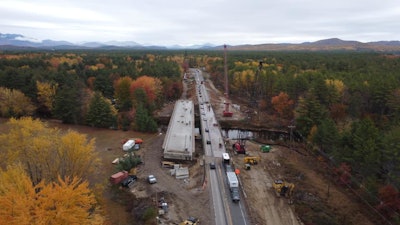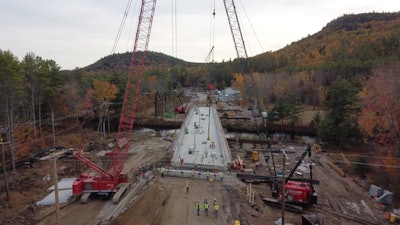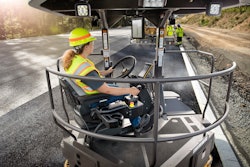
The New Hampshire Department of Transportation has rolled in big temporary bridges before, and it's even jacked up some large bridges.
"But we've never actually demolished a large bridge and slid a new one in in three and a half days," said Jim Bowles, NHDOT district construction engineer, a few years ago in an agency video.
That changed after the agency decided for the first time to use lateral bridge slides to quickly replace two deteriorated bridges. (A time-lapse video of the largest of the bridge slides is at the end of this article. Read on for more details about the project.)
The two bridges – one 170 feet long and the other 400 feet – were built in 1955 on NH Route 16 in Ossipee in an environmentally sensitive riverine area and were crossed by about 18,000 vehicles a day. So NHDOT's top concerns were getting the job done as quickly as possible to minimize traffic interruptions and in a way that reduced environmental disturbance.
The decision was made to build the new bridges beside the existing ones, demolish the old bridges and slide the new ones into place. The contractor for the $17 million project, which also involved another bridge replacement and other road improvements, was Reed & Reed of Woolwich, Maine. The company had 84 hours to perform the demolition and slide operations for each bridge.
 Reed & Reed crews roll the new Bearcamp River Bridge into place after demolishing the old bridge.Reed & Reed
Reed & Reed crews roll the new Bearcamp River Bridge into place after demolishing the old bridge.Reed & Reed
The biggest of the slides occurred October 20 for the Bearcamp River Bridge. Reed & Reed crews built a 410-foot bridge beside the old 400-foot span. Abutments and piers for the new bridge were first built under the old one. The new bridge was built on temporary supports and rollers beside the existing one.
Working two shifts for four days, the company demolished the old bridge, rolled in the new one and jacked it down onto its bearings. It also built the new approach with 85,000 pounds of precast slabs and then placed concrete in time for it to cure before the bridge opened to traffic.
Here's an NHDOT time-lapse Earthcam video of the project:










